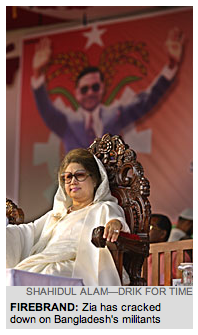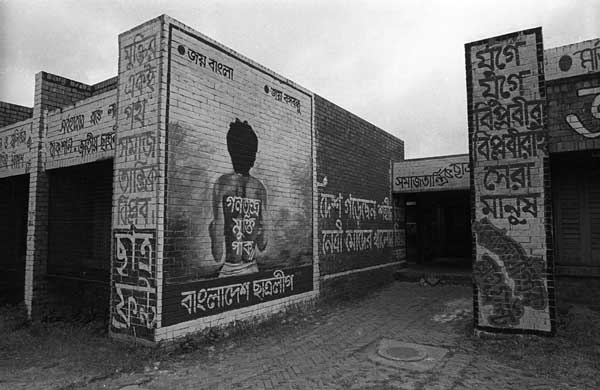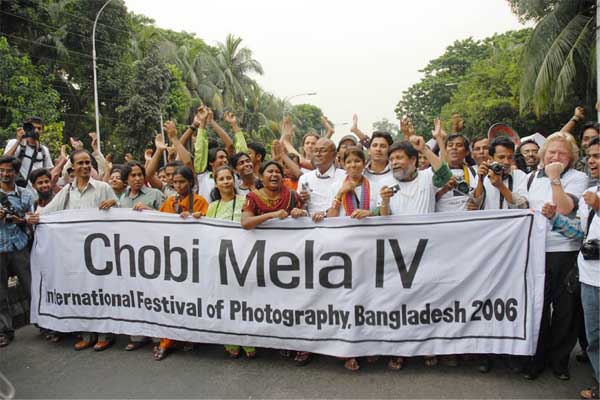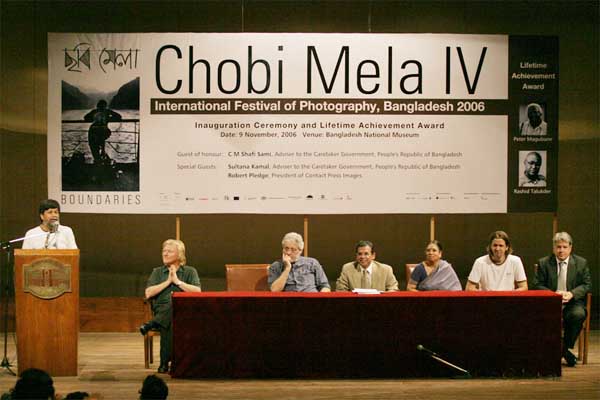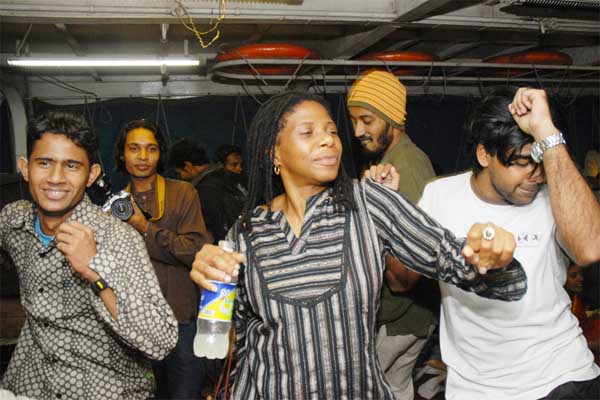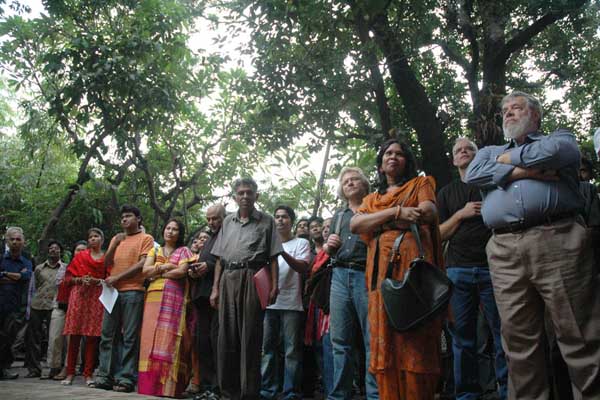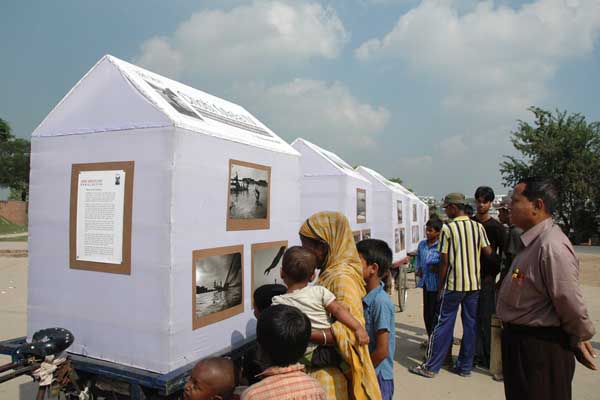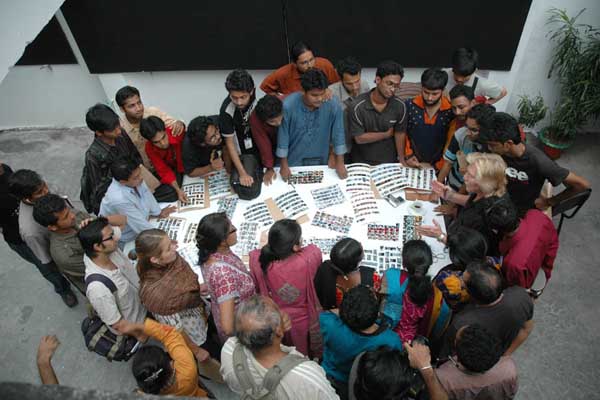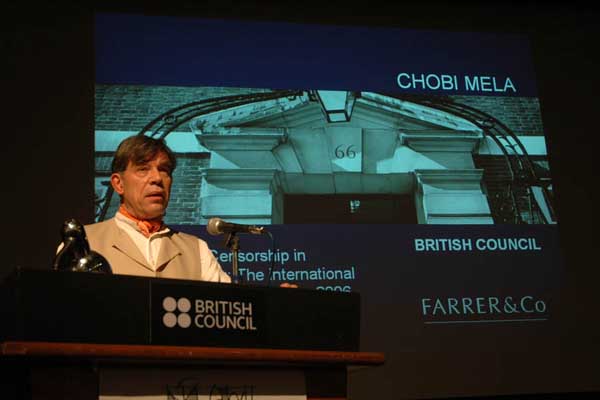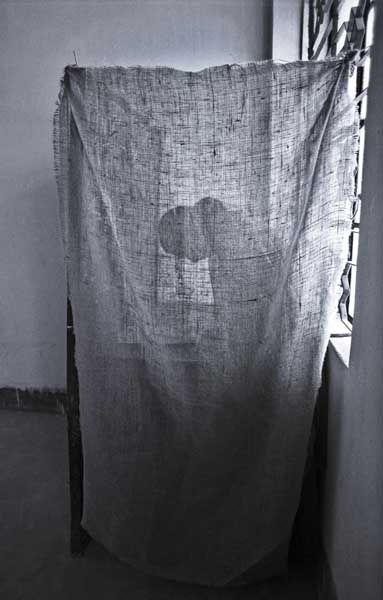![]()

?Come out we won’t shoot?, they had yelled out over the megaphone. Not the most alluring of invitations, particularly when it is from a police van surrounding your flat at midnight. They had thought we were hiding someone and after searching our rooftop had come into our flat. As they left, I had gone out to take pictures from our verandah. Rahnuma had turned up the television volume to hide the sound of the shutter on my Nikon 501, but it still seemed to make a very loud click. Luckily, I wasn?t noticed. It was the 2nd December 1990. Ershad?s autocratic government was feeling the heat. 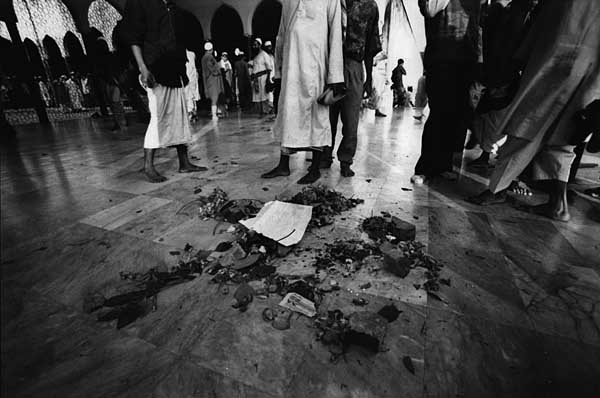
Two days earlier, after the Friday prayers, they had opened fire on the Baitul Mukarram mosque killing a man.
Lawyers had played an important role in our democracy movement. They had upheld writ petitions against the government, and when the government tried to flex its muscles, they came out in protest, united in their stand.

On this day, exactly sixteen years ago, barrister Shahjahan, Sarah Hossain and other lawyers were meant to meet at Drik. We were monitoring the government action, and were ourselves under scrutiny. My colleagues had warned me that plain clothed detectives were looking for me at the office. The detectives seemed to know we lived in Lalmatia, and my colleagues suggested that we stay elsewhere that night. Ma (Rahnuma?s mum), Rahnuma, Tehmina (a lawyer friend of ours) and I went over to Saif and Rini?s flat in Dhanmondi Rd 8. This was not the time for taking chances. The media too had played their role. When censorship became intolerable, they refused to publish. It was that night that Ershad had announced on television that he was going to step down. People were rejoicing in the streets. The following morning the first newspaper was out.
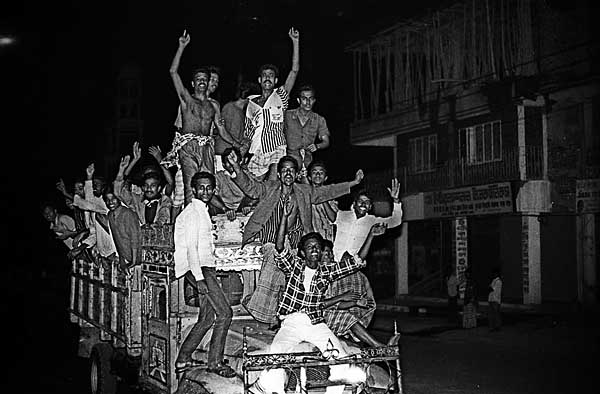

We all went out into the streets. Altaf on his motorbike, me on my bicycle, and the others in whatever transport they could find.

A little girl walked down Mirpur road with a bouquet of flowers in her hand. She too was celebrating the return of democracy. People were dancing in the streets. In Paltan, too often the scene of violence, people gathered in ones and twos.

Men and women in their sleeping clothes, some with children, gathered in the winter night. Chatpati wallas sensing a business opportunity appeared out of the fog. At about 1:30 am Shimul Billa, Bangladesh’s Shirley Temple, sang out ?Bichar poti tomar bichar korbe jara, aj jegeche ei jonota?.

The song ?O judge, the people have risen, it is now the day of your judgement?, was strangely prophetic.
And now in 2006, the chief justice of the supreme court intervenes to prevent a decision
going against a political party, lawyers ransack the court, a president with zero credibility heads a caretaker government, and of all people, Ershad himself is in the streets, demanding the removal of the current president, while Moudud, the chameleon survivor, then Ershad’s right hand man, now holds hands with the chief justice.
4th December 2006
Delhi
Category: South Asia
Stretching the Deadline
![]()
An extra day! Not unusual in itself, but considering that a deadline had been announced so long ago, it seems a strange thing to ask for. What could happen in that extra day that could not have happened before? This extra day brings fresh violence, and while the advisers give us hope of ‘light at the end of the tunnel’, it is unfortunate that yet more loss of life continues while the politicians do their tap dance. If the Chief Election Commissioner (CEC) is to step down, he should do so soon. The presence of a party appointee as head of state, head of military and head of government is bad enough. An appointee Chief Election Commissioner armed with a rigged voter list simply cannot be the basis of a fair and free election.
If there be a genuine belief in a multiparty system, the process must involve, putting in place a caretaker government with backbone, and accepting a free and fair election regardless of the outcome.
Providing electricity, ensuring wage increase for garment workers, eliminating rampant corruption and ensuring freedom from extortion and ?crossfire? are far better means of ensuring support, than empty rhetoric, paid goons and spineless sycophants in key positions. There is more blood on the streets today. It is time politicians were made accountable.
It was Nasreen’s birthday on the 18th, but though friends gathered in their Dhanmondi home and sang songs, and Jamila stayed her chirpy self, gloom pervaded the air. The article in the Daily Star brought up renewed doubts about corruption, cover-ups and selling out the country.
Pathshala alumni Monirul Alam is on vigil outside President House. The expectation is that the CEC will be bringing his resignation letter. Drik photographer Shehab Uddin is in Nepal following the peace agreement. Perhaps we too can hope for peace.
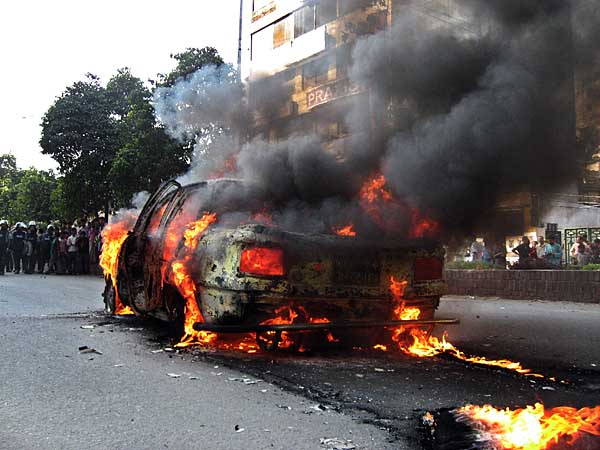
Burning car at Russel Square, close to Pathshala earlier in the afternoon.
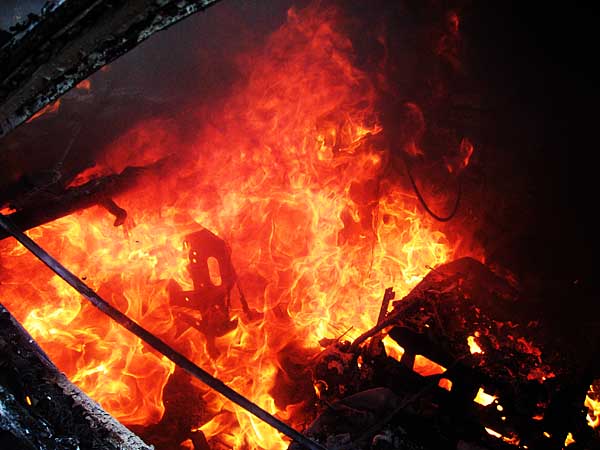
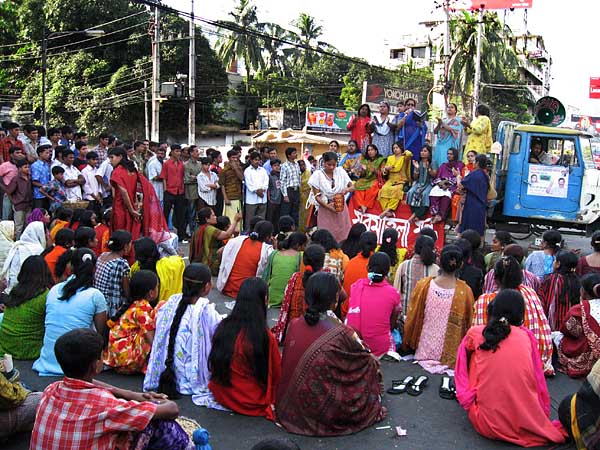
Singing in Mirpur Road
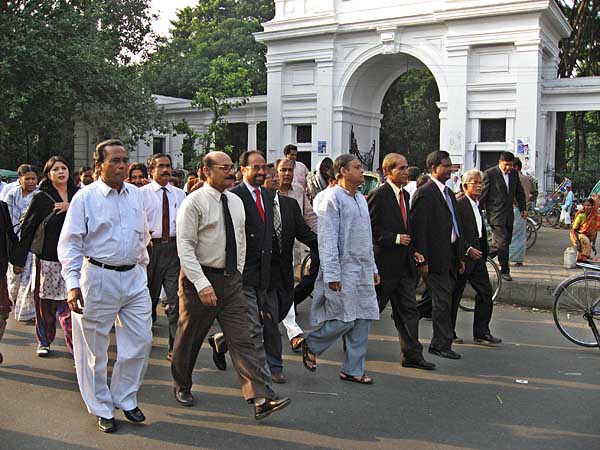
Protesting lawyers coming out of the Supreme Court
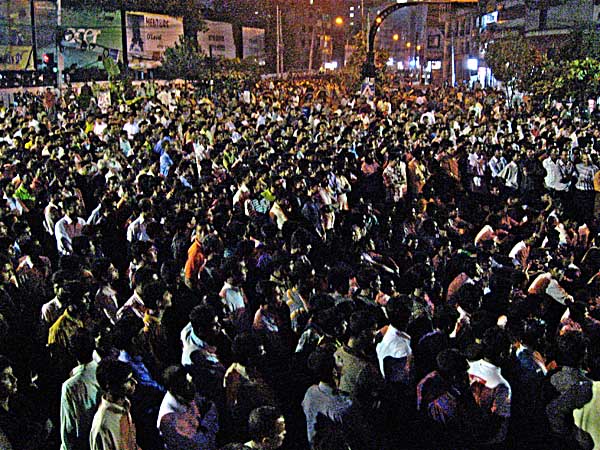
Open air concert at Russel Square last night.
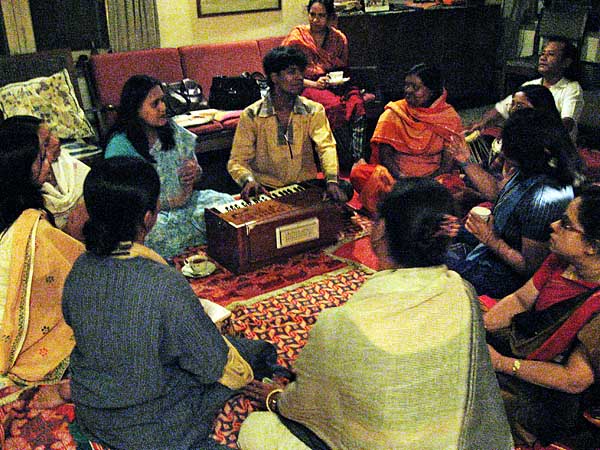
Friends singing on Nasreen’s birthday
Chobi Mela IV continues despite it all. Rashid Talukder opened the splendid exhibition resulting from Morten Krogvold’s workshop, at Shilpakala Academy.
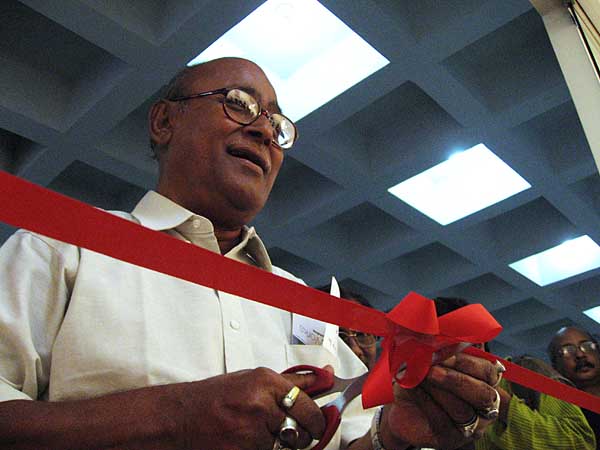
Despite my scraggly beard, Torsten thought I was Father Christmas when I went to drop off the Chobi Mela gift packs at the Goethe Institut, insisting that he teach me the German song that Santa Claus would have sung.
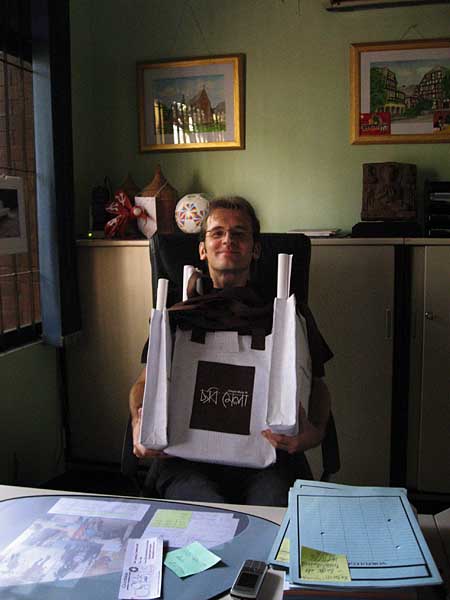
Two and a half years after the opening of the gallery, the airconditioners had still not been installed, but the viewers were not to be deterred, nor were the rag pickers outside Drik, Shanta and her friends, who decided the cool open space of Drik’s new gallery was the best place to try out their break dancing routine.
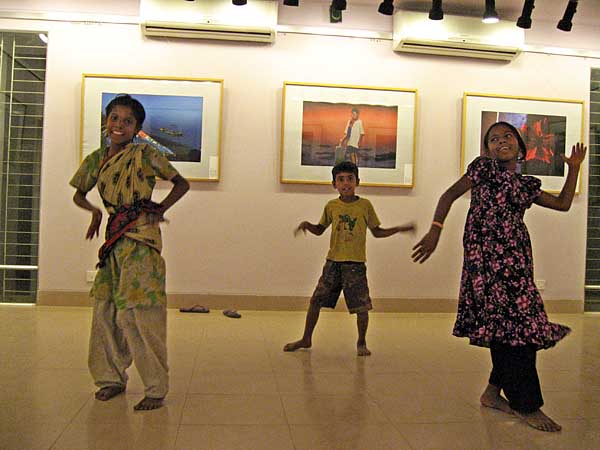
I am sure my pictures on the walls enjoyed their dance. I know I did.
Taking care of the caretaker
It was a dramatic ending to Robert Pledge?s presentation. Via Topu and Omi, I?d received the news that the military had been called out. Robert wanted to finish the presentation, but once I?d announced the government?s decision, the auditorium of the Goethe Institut quickly emptied out. This particular Chobi Mela IV presentation had come to an abrupt end. It was 1987 revisited.
Noor Hossain had painted on his back ?Let Democracy be Freed? and the police had gunned him down on the 10th November 1987. But the people had taken to the streets and while we were scared the military would come out, there was no stopping us. It had taken three more years of street protests, before the general was forced to step down. The people had won. But then it had been a military general who was ruling the country. This was a civilian caretaker government. The general mistrust of a party in power, had resulted in this unique process in Bangladesh where an interim neutral caretaker government headed by a Chief Adviser (generally the most recently retired Chief Justice) and consisting of other neutral but respected members of the public were entrusted with conducting the elections. Why then the military? Yes, the president was a Bangladesh Nationalist Party (BNP, the largest party in the outgoing coalition government) appointee, there are ten advisors who are meant to be neutral.
A free and fair election hasn?t yielded the electoral democracy we had hoped for. After each term, the people have voted out the party in power, only to be rebuffed by a political system that has never had the interest of the people on their agenda. Still, the elections were held, and despite the fact that there had been one rigged election in 1996 (rejected and held again under a neutral caretaker government), an electoral process of democratisation, was slowly developing.
This time however, the total disregard for the electoral process has created a sham, and the three key people in this electoral process, the president, the chief adviser, and the chief election commissioner (CEC), are colluding against the people. The first two, being represented by the same person, was a BNP appointee. He also happens to be the head of the military. The CEC, now a cartoon character, had also been appointed by the BNP while it was in power. Coupled with a clearly flawed voters list, this has removed any hope of a free and fair election. Can the caretaker government genuinely conduct a fair election? I believe it still can, if given the chance, despite the president?s lack of credibility. But for that to happen, the military, the bureaucracy and the police need to remember that it is with the people that their allegiance lies.
However, it does depend upon the removal of the other obstacles. The election commissioner cannot constitutionally be removed, and his removal is central to the opposition demands. What then can we do? There is only one body higher than the constitution, the people themselves. The advisors need to be empowered if they are to pull off this election. Sandwiched between a partisan executive head and another partisan CEC, the advisers risk becoming irrelevant. The only way this can be checked is if people come out in droves. Not ?hired for the day? supporters but ordinary people committed to civilian rule, and a multi-party system.
It is we the people who need to take to the streets. And it is time we sent out the message to all political parties, that an entire nation cannot be appropriated. They need to be told that we did not liberate our country in vain, and despite the poverty and the hardship that we go through, we will not be cowed down, and will not blindly tow a party line, when the party itself has disengaged from the people. If tomorrow, every woman man and child takes to the street of Bangladesh, there is no power, not the military, not the president, not the advisers, not the CEC, not the BNP and not AL that can stop us.
There is hope yet. The advisers have had the good sense to reverse the home ministry?s unilateral decision to call out the army and the president and chief adviser has been challenged for taking such a step. Whether the advisers can continue to take such bold steps depends on our ability to bolster their nebulous position.
Blockades and hartals do hurt the economy, and ironically, it is the person in the street who is the most vulnerable. But faced with an attempt to take away the only chance she has to exercise her right to elect the government of her choice, she has little option left but to take to the streets. As the world is finding out, in Iraq, in Afghanistan, and wherever else there is conflict, a military victory is never a victory. If the anger of the people is to be quelled, then the underlying causes of discontent need to be solved. Flexing the muscles of the military, will only put a lid on the boiling pot, and the longer the lid is pressed down, the bigger will be the eventual explosion. More have died today, and with every death, the flashpoint looms closer.
Chobi Mela IV has continued despite it all. The dancing in the all night boat party,
the heated arguments at every meeting point, the mobile exhibitions, all went on despite the turmoil. The presentations on the night of the 11th, with Yumi Goto, showing work by the children from Bandar Aceh, Neo Ntsoma showing her work on youth culture in South Africa, Chris Rainier showing his long term projects on ?Ancient Marks?, and the deeply personal, but very different accounts of Trent Parke
and Pablo Bartholomew, made one of the most intriguing evenings I can remember. The packed audience that had braved the blockade had perhaps an inkling of what was to come. Morten had a full house for his ?gallery walk? at the Alliance Francaise and Trent?s workshops were packed out. The grand opening was at the National Museum, where we had one fifth of the cabinet opening the show. Kollol gave a passionate rendering of his song ?Boundaries? written especially for the festival. The rickshaw vans designed to take the festival to the public, plied the streets of Old Dhaka, Mirpur and other areas not used to gallery crowds.
The chief guest, adviser C.M. Shafi Sami, the special guests adviser Sultana Kamal and Robert Pledge, photographers Morten Krogvold and Trent Parke and the scholarship recepient Dolly Akhter all spoke eloquently. Little did the audience know about the drama that had taken place the night before. With the museum functionaries doing their best to keep us from putting up the Contact Press Images show (http://www.chobimela.org/contact_press_images.php), we were under pressure, but working all through the night and sleeping on the museum floor, we managed to put the show up on time.
Last night, the empty streets, looked ominous as I dropped off Chulie, Robert and Yang, and people have been dying in the streets.
Since then we have had Morten Krogvold?s passionate presentation at the gallery walk at Alliance, Rupert Grey?s clinical dissection of the law and his dry British humour,
both at the British Council and the Goethe Institut, Saiful Huq Omi?s disturbing but powerful images of political violence, Cristobal Trejo?s poetic rendering of an unseen world, Richard Atrero De Guzman?s honest response to difficult questions about representation and my own presentation on natural disasters and their social impact have all been well attended, despite the tension in the desolate Dhaka streets. The evening presentations close tonight with an insightful film by Indian film maker Joshy Joseph, presentations by Norman Leslie and a behind the scenes look by the photographers at the Drik Photo Department, Md. Main Uddin, Shehab Uddin and Amin, Chandan Robert Rebeiro, Imtiaz Mahabub Mumit and Shumon of Pathshala and Mexican exhibitor Cristobal Trejo. The shows go on as they always do at Drik.
In 1991, a woman with her vote had avenged Noor Hossain’s death.
A fortnight ago, the city was in flames, and a stubborn chief election commissioner is stoking the flames again. It is a fire he and his allies will be powerless to stop.
Shahidul Alam
Dhaka
Chobi Mela site
Blog by Australian curator Bec Dean
Short video on Chobi Mela IV
Dhaka Burns
![]()
Well I’m finally stumped for words. A party affiliated president, now
has the triple roles of president, head of the military and head of
the ‘neutral’ caretaker government. While rumours of a military
takeover abound, and the prime minister’s son threatens that they will
not go to the streets ’empty handed’, the news that the leader of the
opposition has not threatened immediate protests, but has rather opted
to see how the new head of the caretaker government conducts himself,
is a healthy sign. Too many lives have already been lost.
A lot of changes need to take place to erase the mistrust created. A
genuinely non partisan group of advisers need to be selected, the
election commission and the voters list, both clearly not neutral,
need to be changed, and he has to clearly demonstrate that he is no
longer a puppet. Unlikely based on his track record, but one can hope.
Given the current mood, another sham election will surely light the
fuse.
Shahidul Alam
29th October. Dhaka
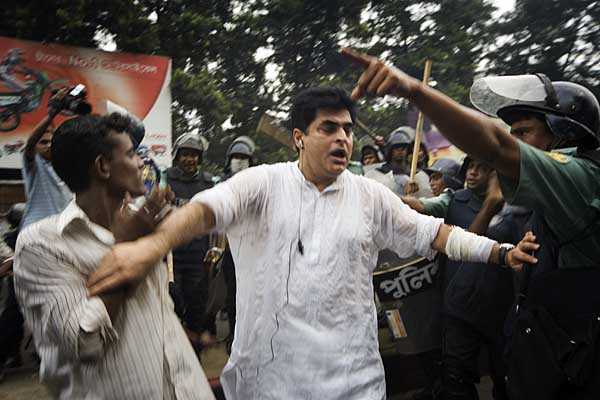
Clashes between opposition and Jamaat due to demand for neutral head of caretaker government. (upload incomplete)
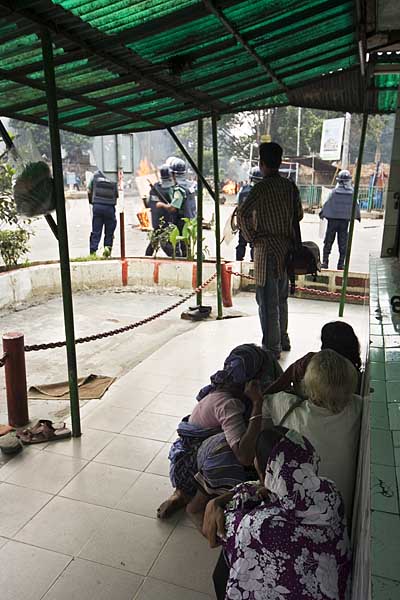
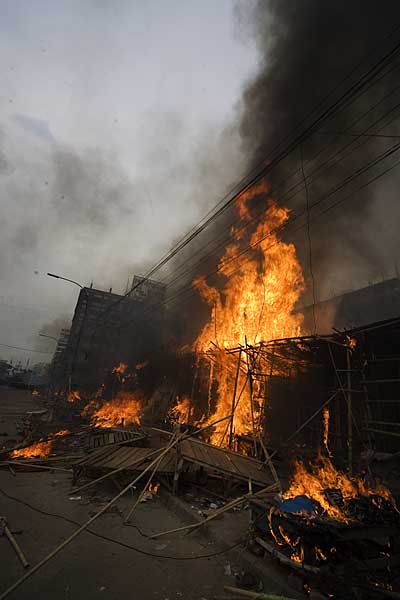
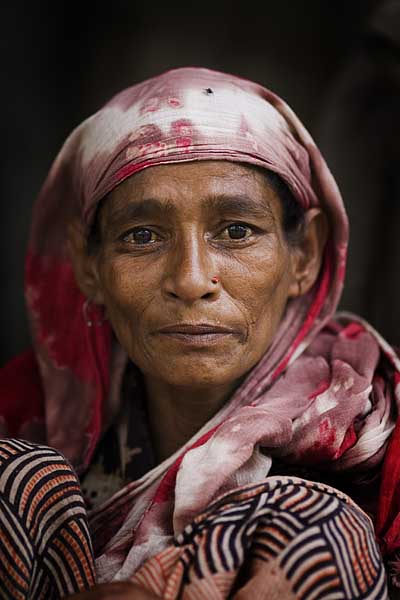
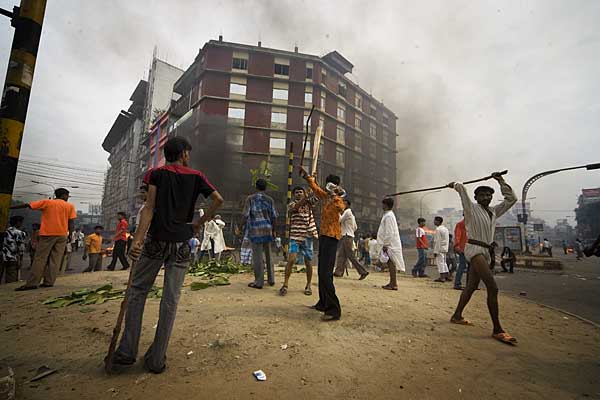
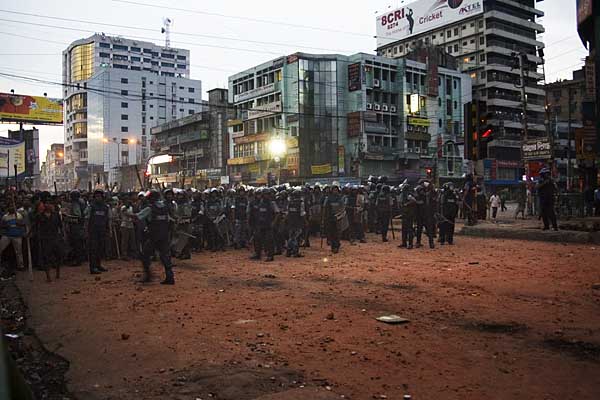
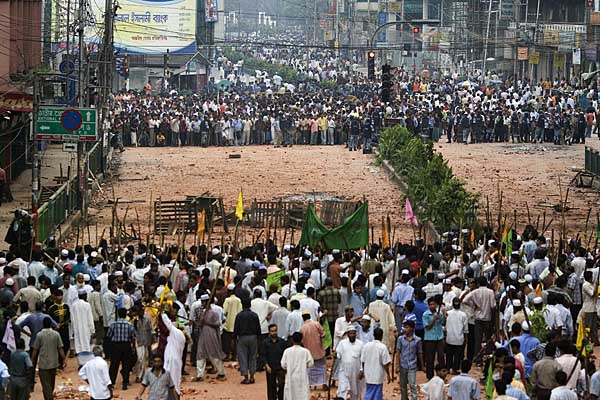
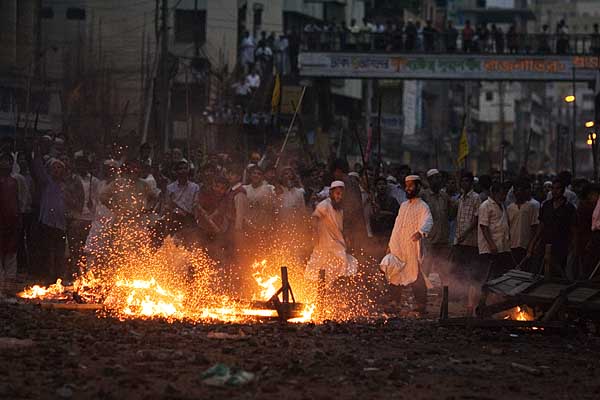
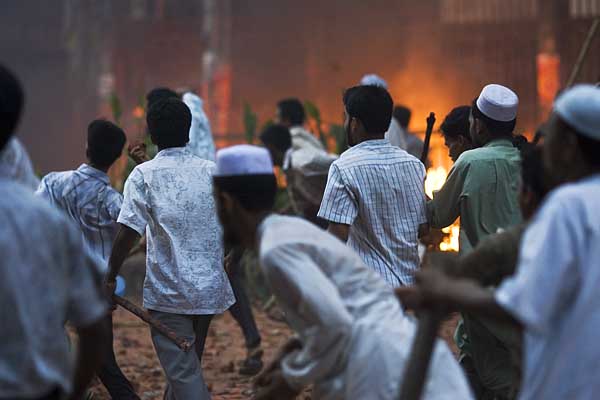
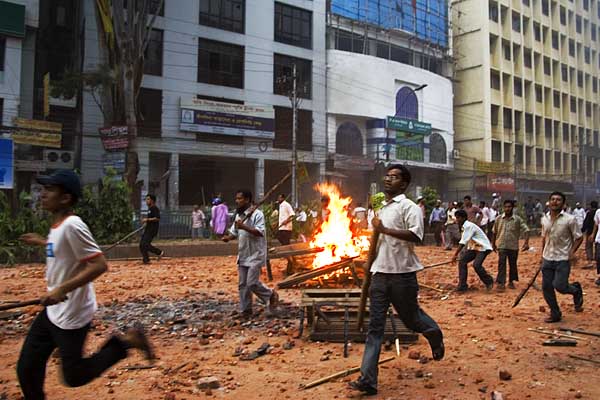
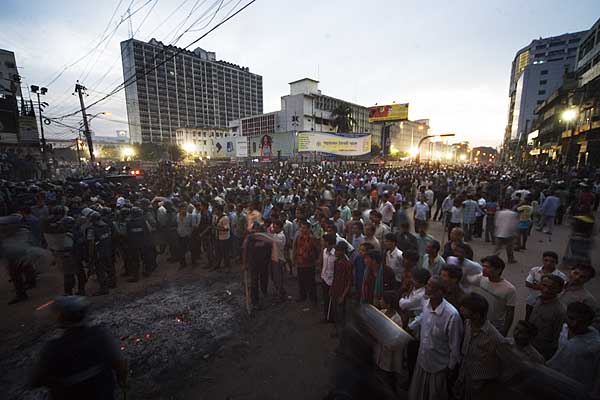
Above photographs taken on 28th October 2006 by Shahidul Alam.
And today 29th October 2006, a party affiliated president, makes himself president, head of military and head of ‘neutral’ caretaker government. Today’s photographs taken by Shehab Uddin. No unauthorised copying of any kind. To publish these or high res images, contact library@drik.net. More pictures and text to follow.
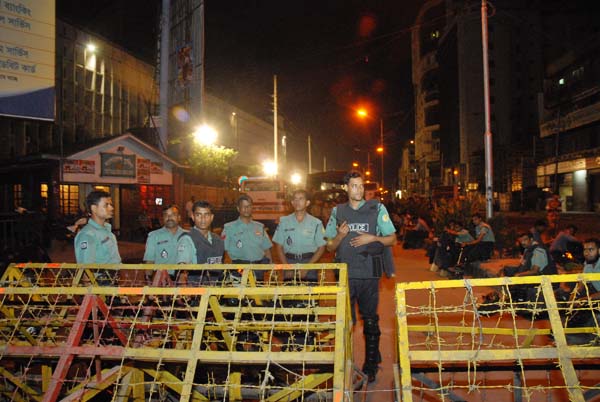
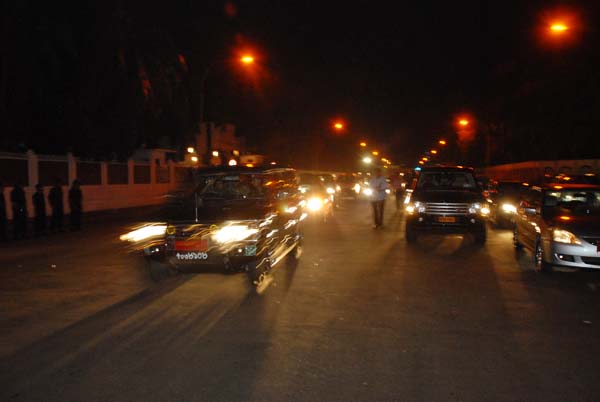
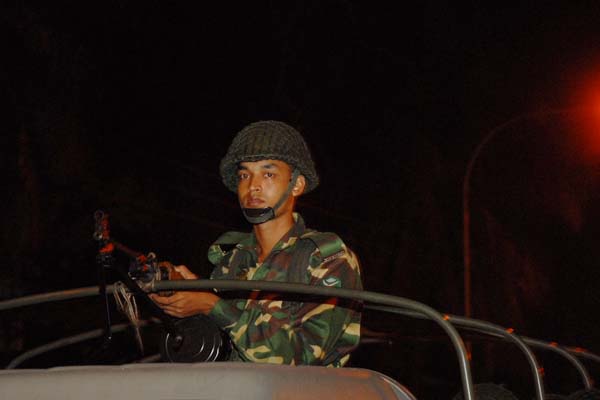
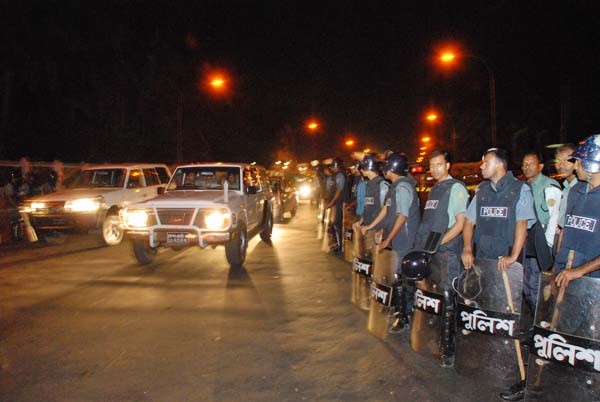
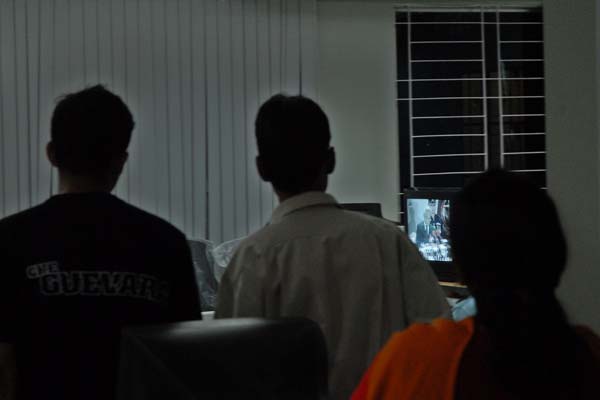
Bank for the Poor
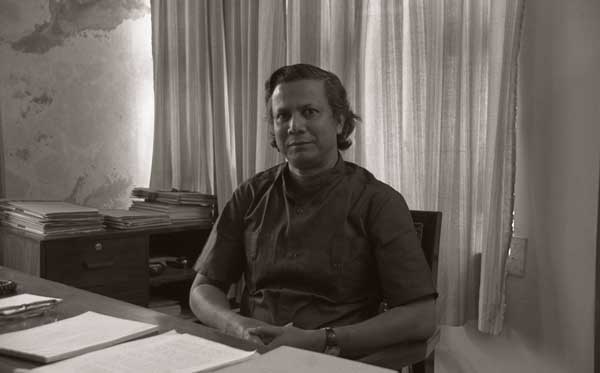
It was 1988. The flood waters had reached Dhaka, and I needed a boat to get to the head office of the Grameen (Rural) Bank. A soft spoken unassuming gentleman, casually clad, sat at a plain wooden table. There was no air?-conditioning and the fresh breeze flowed freely through the open windows. My posh camera seemed quite out of place here.
Dr. Muhammed Yunus shook my hands warmly and words flowed easily from the man who had created one of the most remarkable organisations in banking history.



The Grameen Bank gave money only to the poor. Loans to the landless were interest free. None of the debtors had collateral. 75% of the bankwas owned by the landless who could purchase shares of Take 100 (about two pounds; each in 1988. Only one share was allowed per person). The bank boasted 346 branches and 3,000,000 members, 64% of whom were women. Incredibly, about 98% of the loans were returned! It was rapidly expanding and by the following year, Yunus hoped to have 500 branches.
An economics graduate from Vanderbilt University, Yunus had been teaching at Tennessee State University when war broke out in Bangladesh in 1971. He got actively involved in the liberation movement and returned to the newly created nation in 1972 and took up teaching at Chittagong University.
The famine in ’74 touched him deeply. The sight of the dying in the streets made him question the validity of the economic theoories that he espoused. During this soul searching he mixed intimately with the villagers and learnt of their habits, their values and their problems. One of them was a woman who made Moras (bamboo stools). She was skilled and conscientious and worked long hours. He was appalled when he discovered that she earned only eight annas (about one pence) for her daily labour! Angered and dismayed, he sought out the reasons for this shamefully unfair setup.
It had long been claimed that laziness, lack. of skill, and extreme conservativeness was the root cause of poverty in Bangladesh. Here was a woman who was skilled, worked extremely hard and had taken the initiative of setting up a business for herself and was still being cruelly exploited.
She did not have the money to buy the bamboo, so she had to borrow from the trader. He paid a price for the finished stool which was barely the price of the raw materials. She ended up with a penny a day!
With the help of a student Emnath, Yunus made up a list of 42 people who worked under similar conditions. He paid out their total capital requirement of Taka 826 (less than a pound per head) from his own pocket. It was a loan, but it was interest free.
Aware that this was not the real solution to the problem, Yunus approached his local bank manager. The man laughed. The idea of giving money to the poor, and that too without collateral, was to him hilarious. Undeterred, Yunus approached the assistant general manager of Janata Bank:, Chittagong. The manager was encouraging,, but felt that in the absence of collateral, a guarantee by influential people in the village would be necessary. Yunus realised that this would eventually lead to some sort of a slave trade. The bank was adamant, and eventually he talked them into accepting him as the guarantor. The manager was reluctant in the beginning, but felt he could take the risk, the sum being so small.
The system worked, all the loans were repaid and more people were offered loans. Yunus suggested that it was time the bank took over the responsibility themselves and lent out money directly to the villagers.?So I tried to establish that this could be done as a business proposition. I became vocal against the banking institutions, arguing that they were making the rich people richer and keeping the poor people poor through something called collateral. Only a few people could have access to funds. The bankers were not convinced.
Finally they challenged me to do it over a whole district, not just a few villages. They said if I could do it over a whole district, and still come back with a good recovery, then they would reconsider. I accepted their challenge. They asked me to go far away, to where people would not recognise me as a teacher but would instead think I was a banker. So I went to a far flung district in 1978, and started working there.”
It worked beautifully. They had almost a 100% recovery. The small loans made a big difference to the people, but the banks still dragged their feet. Yunus realised that if he went back to the University, the project would die. He suggested the formation of a new bank. One owned by the people themselves. The banks were skeptical, but he got a lot of public support, and eventuual1y in October ’83, an independent bank called the Grameen Bank was formed.
Dr. Yunus is modest about his own contribution. Asked if the bank would survive without him, he smiled “Look at what we have achieved, could it ever have been possible without dedication at all levels ??
There is a more important reason for the bank’s survival. Contrary to most other viable commercial banks, this one is truly designed to serve the people.




Always quick to accept innovations, Professor Yunus was the first person to order an email account when we set up Bangladesh’s first email service in the early nineties. He was user number six, the first five accounts being Drik’s internal numbers. Later he ordered the entire Grameen office to be networked and had generic email addresses issued to key personnel.
The bank now has nearly six and a half million members, 96% of whom are women. The $ 5.3 billion given out as loans and the $ 4.7 billion recovered are figures any commercial banker would be proud of. Since then other Grameen entities under the more recently formed Grameen Foundation have been born. Grameen Phone, a highly successful telecommunications company has provided phones to rural women, many of whom have become successful entrepreneurs. However both the Grameen Bank and micro-credit have had critics. The high rate of interest is seen to be exploitative by many. There have been accusations that the methods of recovery, often by overzealous bank officials, have led to extreme hardship. 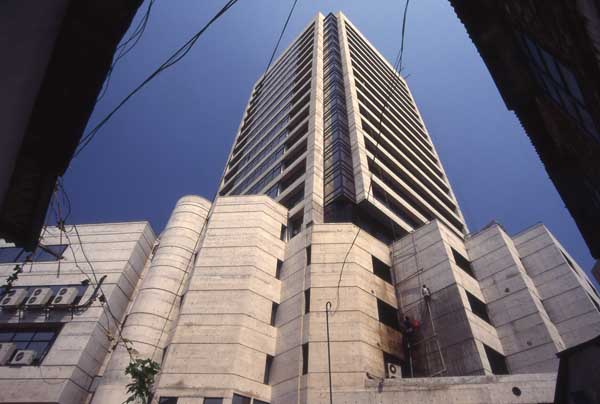
The skyscraper that now houses the bank, many feel, distance it from the poor it represents. The close links with Clinton and Turner, and the uncritical position taken by Yunus in his public interactions with them, has also been viewed with suspicion. Yunus makes light of these observations. Regarding the criticism of his model, he has a simple answer. ?I make no claims to having a perfect system. The problem has to be solved. Should someone come up with a better solution, I would happily adopt it.?
Bangladesh has largely been known for floods famine and other disasters. Yunus has provided Bangladesh with a pride it badly needs. Many had hoped that he would enter politics, providing an alternative to power hungry politicians that people have lost trust in. While he has steered away from mainstream politics, Yunus was an adviser to the caretaker government. That this popular teacher turned banker should be the Nobel Peace Prize winner in 2006 is a source of great joy to Bangladeshis, but an honour they feel was long overdue.
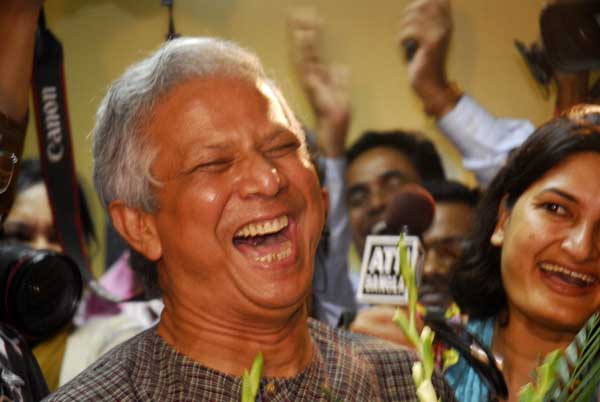
(Photo by Munem Wasif / DrikNEWS)
Shahidul Alam
Drik Picture Library Ltd.
Dhaka 1988 and 2006
High resolution photographs available from Drik Picture Library: library@drik.net
and DrikNews: driknews@gmail.com, driknews@yahoo.com
Profits versus the Poor
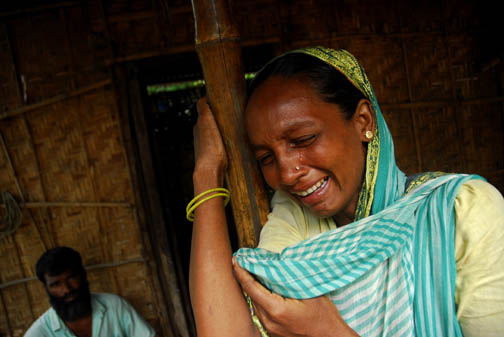 ?I have lost a son, maybe I?ll lose another, but I won?t let them setup a coalmine here.? To Tahmina Begum who had lost her son Toriqul to police bullets, her land was also her family.
?I have lost a son, maybe I?ll lose another, but I won?t let them setup a coalmine here.? To Tahmina Begum who had lost her son Toriqul to police bullets, her land was also her family. 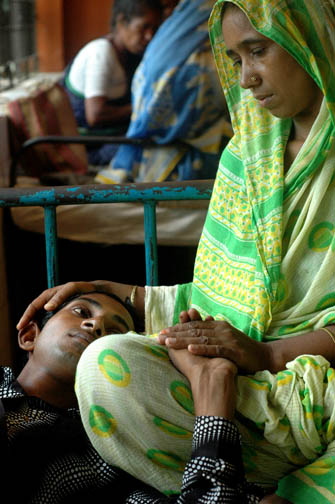 It could have been a ?B? rated western except that it is set in the east.
It could have been a ?B? rated western except that it is set in the east. 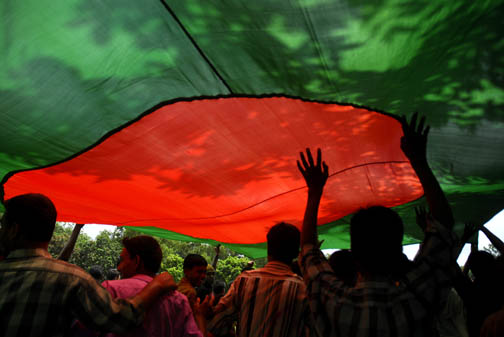 People wanting to hang on to their ancestral land versus mining companies wanting huge profits. There have been only minor changes from previous scripts. When farmers wanted fertilizers and seeds, the police had opened fire killing them, when they wanted electricity to irrigate their soil, the police had opened
People wanting to hang on to their ancestral land versus mining companies wanting huge profits. There have been only minor changes from previous scripts. When farmers wanted fertilizers and seeds, the police had opened fire killing them, when they wanted electricity to irrigate their soil, the police had opened 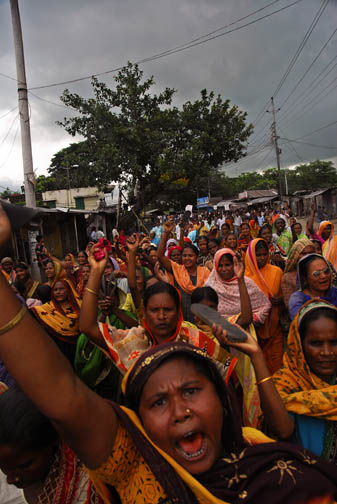 fire killing them. Now that they want to retain their land rather than have it converted into coal mines again the police have opened fire killing them.
fire killing them. Now that they want to retain their land rather than have it converted into coal mines again the police have opened fire killing them. 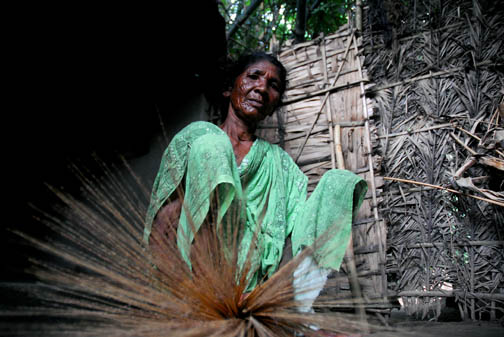 The Shaotals, being indigenous minority groups, find themselves even more vulnerable within this persecuted community. In the shootings on the 26th September 2006, in Phulbari, Dinajpur, in northwestern Bangladesh, at least six villagers are known to have been killed, over a hundred are said to be missing.
The Shaotals, being indigenous minority groups, find themselves even more vulnerable within this persecuted community. In the shootings on the 26th September 2006, in Phulbari, Dinajpur, in northwestern Bangladesh, at least six villagers are known to have been killed, over a hundred are said to be missing.
These strangers are family now
PHOTOS and TEXT by SHEHAB UDDIN
Nepal Times Issue #304 (30 June 06 – 06 July 06)
Most people find shelters for senior citizens depressing and avoid visiting them. But working on this photo feature at the Pashupati Bridhashram over the past six months, I have been inexplicably uplifted. I forget the stress of living in Kathmandu and my homesickness for my native Bangladesh. I feel fortunate that I have a family, as many of the senior citizens once had. But what gives me hope is that even though they have lost families and possessions, they still care. They care for each other and they retain a deep sense of humanity. The story of how they landed up here is almost always the same: in their old age they became a burden on their families who dumped them at Pashupati. For the elderly, it?s sometimes a relief that they are in such a holy place and don?t have to bear the taunts of a home where they are no longer welcome. None of them came here willingly and no one has anywhere to go. The Pashupati Bridhashram is run by the government so its budget is limited, it is congested, short-staffed and shows signs of mismanagement. There are 230 residents, 140 of them women.

GREETING: ?Namaste, aram?? That is how Sankule Lati, 77, greets strangers with a namaste and a quick tilt to her head.

LAUGHING: Til Kumari Khatri, 71, and Yadongba Tamang, 70, laugh and play like children. Til Kumari has been here since 1998. Her daughter-in-law brought her to the shelter one day and left saying: ?I?ll be back soon.? She never came back.

CHANTING: Every morning and evening residents gather for bhajans. Those who can?t walk to the prayer room chant from their own beds.

BATHING: Dhana Kumari Ranabhat, 99, takes a bath with the help of her husband Dil Bahadhur Ranabhat, 90. The couple is lucky, few here still have their spouses. Dhana Kumari was forced here after her husband died but married Dil Bahadhur, a retired soldier.

CHATTING: Tirtha Maya Thapa, 75 and Man Kumari Thapa, 75, sit and chat. Tirtha Maya was so busy taking care of her parents, she never married. But after they died, her relatives evicted her from her house. Man Kumari?s long lost son came and took her home a few months ago.

EATING: Bishnumaya Lati, 72, takes her evening meal with her two favourite dogs in attendance. She lives here with her husband.

COOKING: Kanchi Khatri cooks food in the shelter. She was the maid servant at the home of an astrologer and when she was no longer able to work nine years ago, her employer brought her here.

PRAYING: Laxmi Thapa, 68, prays to a wall full of pictures of the gods. She doesn?t remember where she was born or her family since she was married very young. Laxmi worked as a domestic all her life. Her alcoholic husband used to beat her up. When she broke her arm, her employer abandoned her so she came here. Now she prays all the time. ?I spent all my life helping others,? she says, ?now there is no one to help me.?

FEEDING: Dipa Thapa, 75, has two pet cats in the shelter. They are her only friends. She used to sell flowers in Pashupati and when her husband died, she came here.

COMBING: Ratna Maya Katiwada, 68, has kept to herself since she came here three years ago. No one knows the whereabouts of her family or where she is from.

RECITING: Shanti Tuladhar recites a poem from her book, Unko Samjhana. She loves poetry and is still writing. Married at 30, her husband was in the army and when he died 12 years ago, she was sent here. Shanti doesn?t like to talk about her son. She reads us her favourite poem:

In my old age
Shanti Tuladhar
My sons have grown up
Huts have turned into high-rises
They?re adding floors one by one
For me, there is just the pyre left
As the house grew taller
We were pushed lower
Lower than the staircase dark and dank
My son has grown up but what has he done?
I became a burden and he brought me here
My family is foreign forever,
These strangers are family now.
—————————————————————————–
to publish these pictures or others from Drik Picture Library, please contact:
Asia
Mr. Md. Abdullah Al – Faruque
Photo Librarian
Drik Picture Library Ltd.
House # 58
Road # 15A (New)
Dhanmondi R/A
Dhaka – 1209
Bangladesh
Tel: +8802-8112954, 8123412, 9120125
Fax: +8802-9115044
Mobile: +8801711177840
email: library@drik.net
web: www.majorityworld.com
Rest of the World
Mr Rowan Watts
Majority World (UK)
29 Walter Bigg Way
Wallingford
Oxfordshire
OX10 8FB
The United Kingdom
Tel: +44 1491 832627
Mobile: +44 (0)776 599 1874
skype: creativexec
email: creativexec@aol.com
web: www.majorityworld.com
Demagogues at Airports
![]()
He looked worried as most passengers would do, waiting for luggage that should have arrived. It had been a while since EK005 from Dubai had landed at Heathrow terminal 3. Belt 2 was almost empty. They announced that one lot of bags was yet to arrive. There was hope yet.

Now that we were the only two passengers left, we made eye contact. With a faint nod he registered my recognition, as celebrities often do. He asked me in Urdu, where I was from. Dhaka, I muttered, and we shook hands. He found no need to introduce himself as Mian Muhammad Nawaz Sharif, the former prime minister of Pakistan. I resisted the temptation to ask him about his property in London, or the proposed tryst with Benazir.
This had occurred before, once at terminal 4 when General Ershad, the former president of Bangladesh had arrived. No fanfare, no waiting crowds, people walking by. I wondered how it felt. They both had absolute power when they ruled, and had used it with abandon. I remembered our resistance in the streets, the police brutality, the teargas. Noor Hossain and Milon’s death. Despite all the rhetoric about their closeness to the people, fending for themselves at the airport terminal was probably as near as they ever got to seeing what it was like on the other side.
7th June 2006
Biarritz
Boundaries
Chobi Mela IV
She packed her load of firewood onto the crowded train in Pangsha. The morning sun peered through the lazy winter haze. The vendors called ?chai garam, boildeem? and the train slowly chugged out of the station, people still clambering on board, or finishing last minute transactions. Some saying farewell. The scene had probably not been very different a hundred years ago. Maybe then, they carried pan in place of firewood, or some other commodity that people at the other end needed. She would come back the same day, bringing back what was needed here. Only today she was a smuggler. The artificial and somewhat random lines drawn by a British lawyer had made her an outlaw. She was crossing boundaries. There were other boundaries to cross. The job a woman was allowed to do, the class signs on the coaches that she could not read but was constantly made aware of. The changing light and the smells as sheet (winter) went into boshonto (spring). The Ashar clouds that the photographers waited for, which seemed to wait until the light was right.
Rickshaw wallas find circuitous routes to take passengers across the VIP road. Their tenuous existence made more difficult by the fact that permits are difficult to get, and the bribes now higher. Hip hop music in trendy discos in Gulshan and Banani with unwritten but clearly defined dress codes make space for the yuppie elite of Dhaka. The Baul Mela in Kushtia draws a somewhat different crowd. Ecstasy and Ganja breaks down some barriers while music creates the bonding. Lalon talks of other boundaries, of body and soul, the bird and the cage.
Photography creates its own compartments. The photojournalist, the fine artist, the well paid celebrity, the bohemian dreamer, the purist, the pragmatist, the classical, the hypermodern, the uncropped image, the setup shot, the Gettys and the Driks. The majority world. The South. The North. The West. The developing world. Red filters, green filters, high pass filters, layers, masks, feathered edges. No photoshop, yes photoshop. Canonites, Nikonites, Leicaphytes, digital, analogue.
The digital divide. The haves, the have nots. Vegetarians, vegans, carnivores. Heterosexuals, metrosexuals, transsexuals, homosexuals. The straight, the kinky. The visionaries, the mercenaries, the crude the erudite, the pensive the flamboyant. Oil, gas, bombs, immigration officials. WTO, subsidies, sperm banks, kings, tyrants, presidents, prime ministers, revolutionaries, terrorists, anarchists, activists, pacifists, the weak, the meek, the strong, the bully. The good the evil. The hawks the doves. The evolutionists, the creationists. The crusaders the Jihadis. The raised fist, the clasped palms. The defiant, the oppressive, the green, the red. The virgin.
Whether cattle are well fed, or children go hungry, whether bombs are valid for defence, or tools of aggression, boundaries ? seen and unseen ? define our modes of conduct, our freedoms, our values, our very ability to recognise the presence of the boundaries that bind us.
Festival Website
Colliding with the State
![]()
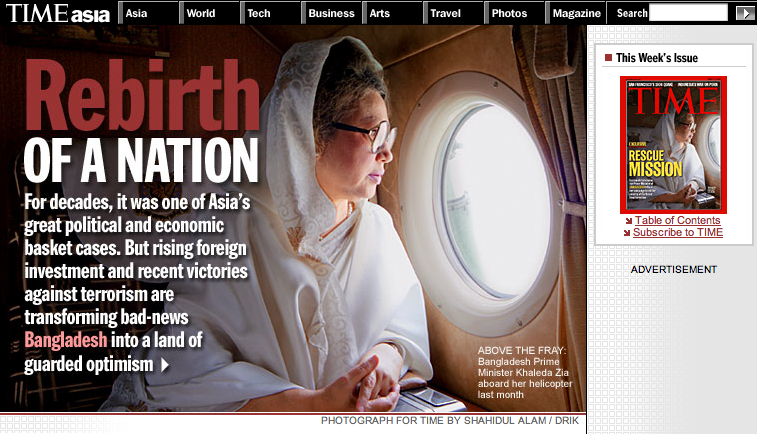
Lisa Botos from the Time Magazine office in Hong Kong, had done most of the hard work. Permissions had been obtained and the protocol arrangements had been made. The shoot was on. Having gone through the security hoop at the prime minister?s secretariat, I had settled in at the waiting room along with my colleagues photographer Aminuzzaman from Drik and writer Alex Perry and William Green from Time. That was when the trouble started. Officials rushed to usher me out of my seat. I was wondering what other security alert I had triggered off. My faux pas was somewhat more embarrassing. I had been sitting on the prime minister?s chair.
I had only been allocated a few minutes for the cover shoot, which went well despite one of my lamps blowing on me, but luckily the prime minister had agreed to our suggestion that we follow her on her trip to Pabna. I scurried to change gear for the outdoor shoot. Emptying memory cards, handing over existing images to to take to the library, a quick visit to the loo, were all things that needed to get done, except that I was told ?hurry, she is on her way to the helicopter.? Dumping equipment into my camera bag, handing over my laptop to, I stuck my digital wallet into the pile and made a dash for it. The loo would have to wait. That was when a strong arm jutted out in the corridor. The security guard had prevented me from running into the prime minister! Alex calmly asked me if I had run into other heads of state before. ?Only once? I had said, as I had nearly bumped into Mahathir while running up the stairs at the Mandarin Oriental in Kuala Lumpur. But that was a long time ago.
It was a long and eventful day and one I must write about, but for the moment you?ll need to settle for the cover image of the current Time Magazine (10th April 2006 issue) and Alex?s writeup.
